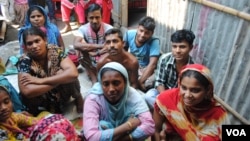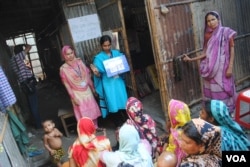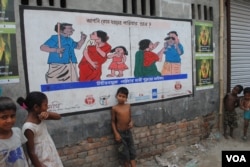In Bangladesh, domestic violence against women and girls who live in slum areas is widespread. Efforts to improve the situation are difficult because of ingrained cultural norms. But a campaign by a group of non-profit organizations is trying to spark change among thousands of the country’s poor.
In a slum in Dhaka, 10 people sit in a narrow lane between small homes with tin roofs. Women with colorful shawls on their heads sit on a mat next to four men. They listen as two female health workers talk about sexually transmitted diseases and contraceptives. The health workers also display photos of diseased genitals.
Shokhi, making a difference
The surprisingly frank discussions are part of a program called “Shokhi” which aims to improve health and reduce domestic and sexual violence in 15 slums in Dhaka. The program, which is sponsored by several non-profit organizations, offers legal aid, health and reproductive health services, in tiny offices throughout 15 slums, as well as counseling and community information sessions on topics like conflict resolution or anger management.
The audiences are locals who live in the slums. The men typically work as auto rickshaw drivers and construction workers while the women are tailors, small shopkeepers and homemakers.
Community ambassadors
They all volunteered to be so-called “change makers” who act as community ambassadors against gender-based violence and lead small groups. There are 1,500 of these change makers trained by about 45 professional community workers.
Rashida Begum, a 32-year-old tailor, became a change maker more than a year ago. Her husband used to slap her frequently, she said. But after Shokhi’s awareness sessions, her husband has not hit her in a year.
“Before, if anything happened in the home, he got very angry at me and would beat me. Now, he’s working with this group and getting a lot of information, that you shouldn’t do this,” she said.
After she learned about her legal rights, Rashida even got her husband arrested after he illegally married a second wife. He eventually ended that marriage and returned to Rashida and her family.
In Bangladesh, gender-based and domestic violence is widespread. Physical and emotional abuse by husbands is common among the poor.
Women and girls in urban slums experience high rates of violence and poor sexual and reproductive health. Girls who marry early are more vulnerable. Bangladesh has the world’s fourth highest rate of child marriage. Here, 65 percent of young women marry before the age of 18.
Changing behaviors
But through Shokhi, men and women are learning that abuse is unacceptable and illegal. Through small group sessions, many women and girls are learning about their rights for the first time.
“It’s not just telling them you that you have a right not to be beaten, but where to go if this happens, what you can do, who will help you,” said Sara Hossain, honorary executive director of Bangladesh Legal Services Trust, one of the organizers of Shokhi.
Three other nonprofits are involved with the program, including Marie Stopes Bangladesh, the reproductive health nonprofit; the Bangladeshi Women’s Health Coalition and We Can, an anti-domestic violence nonprofit.
Reducing violence, abuses
Shokhi is modelled after a pilot program in Dhaka called SAFE, run from 2012-2013 by some of the same nonprofits. That program was evaluated by Population Council, the U.S. non-profit research institute, and ICDDRB, a public health institute.
Their study of more than 12,000 participants showed that the program reduced violence against women and girls. When men were included in activities, violence dropped even more.
More people used contraceptives, and more victims of violence sought help from informal sources of support. Among adolescent married girls, sexual and physical violence decreased from a range of 9 to 20 percent among different sample groups.
For participants, the sessions can be empowering. One woman change-maker said, “Public action is the best action. The police can’t do it. Before, if something happened in the home next door, you ignored it. Now you can tell them, ‘You can’t do that.’”
Since the program started in 2013, it has reached 10,000 people directly through information sessions and services. It has reached tens of thousands more indirectly through media campaigns and street theater. Shokhi aims to reach 500,000 people by 2018.
Involving men in awareness sessions and as change makers led to a greater reduction in violence, according to surveys from an earlier pilot program in Dhaka. Community groups led by change makers include at least 30 percent men.
On a hot spring day, another group of 20 slum residents were starting their three-day training to become change makers. Amid the women, there were five men who sat on the floor of a school in a slum area in Dhaka called Mohammadpur.
Mahubab Alam, a 45-year-old night security guard, attended the training during his off-hours. He explained why he volunteered to become a change maker. “We think we live in an undignified way. We have an opportunity to change this,” he said.
Despite the difficulty of fighting gender-based violence in Bangladesh, Shoki is raising hopes that change can happen, from the ground up.













